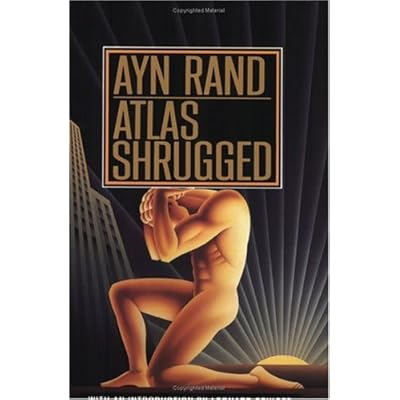Thursday, August 11, 2011
Review - Ayn Rand - Atlas Shrugged
Everyone should be rewarded for their own work. That is Ayn Rand's novel "Atlas Shrugged" reduced to one sentence. It is a doctrine of which no one can argue. At 1168 pages, Rand eloquently challenges nearly every moral concept known to man.
For example, one character states that he wishes he could kill Robin Hood for all the damage he has caused, and he spends several pages explaining why he steals from the "poor" to give to the "rich." Yes, it sounds appalling the way I write it, but Rand helps it to make sense. The character doesn't really want to kill Robin Hood (whose cause may have been just), but rather despises politicians misusing the legend to support redistributing wealth from the rich to the poor.
Dagny Taggart is the Operating Manager of Taggart Transcontinental. Her brother, James, is President of the railroad. Though they work together, they do not see eye-to-eye. James always wants to do what's moral in the sight of men--help people when they're down; lobby for legislation that's for the common good; thwart greedy people. Dagny just wants to do what is necessary; find solutions that are mutually beneficial for both parties; and make lots of money.
This is how Rand introduces the characters and then she turns things around. The reader quickly learns that Dagny is actually the "good guy," and James is the "bad."
This is where I come to my first complaint. Practically every character in this book falls under one of these two molds.
#1) The camp of James. These are the ones who claim to be moral--to do what is good for all mankind. However, they are all lazy, shifty-eyed, all-around scumbags. They also happen to be the politicians who are in charge.
#2) The camp of Dagny. They don't pretend to be moral, but they are noble. They always stick to their word--well, most of the time. It is very difficult for them to lie. All they want is to earn an honest buck and receive the rewards they deserve.
One can't help to think that the James-ites would be called Democrats today, and the Dagny-ites would be Republicans (or more correctly Tea Partyists). Because of this unfortunate binary setup, the book loses a lot of credibility and the ability to persuade. It wreaks of a gigantic straw-man argument. In reality, we have many good, noble "Democrats," as well as many shifty-eyed, greedy "Republicans." In my opinion, the existence of these characters (absent in her book) would have served to greatly challenge her theories, and make for more persuasive arguments.
My second complaint: a full 10% of the book is philosophical monologue. It's fun to read if you happen to be a student of philosophy, but as a plot advancer, this technique fails miserably. The first such monologue happens around page 410 (in the most recent Plume paperback edition) when Francisco speaks at an informal party. He orates 5 full pages on why money is not the root of all evil. And everyone listens! A madame says shortly after the speech, "Well, it's certainly a funny way to talk at a party!"
I thought that the 5 pages was bad enough, but it gets worse, especially in the second half of the book. One monologue lasts over 60 PAGES! That was one part I skimmed through. Then I realized that Rand often repeats herself. If she tried to publish this today, her editor would have helped her to trim all that fat.
My third complaint: I did not find Dagny to be the ultimate role model. I believe in her views, but I question her moral makeup. She doesn't hesitate to sleep with any man that she considers to be powerful. When a more powerful man comes along, she'll dump the previous man to go after the next. With these strong Tristan und Isolde overtones, I couldn't help thinking that Dagny was a slut. Her lack of loyalty toward one particular man rubbed me the wrong way. She never expresses remorse for her decisions, but rather she praises them.
I suspect this is really Rand's attempt to rationalize her own affairs. But her arguments lost me. If her ideal world necessitates these affairs, then I seriously need to rethink her philosophy.
A corollary third-and-a-half complaint is that the Dagny camp failed to demonstrate any charitable acts. In fact, Rand devotes a whole chapter against the idea of being one's brother's keeper. I know what Rand was trying to express, but if you take her arguments to the extreme, it turns into a form of Nazism, where anyone who is unable to produce isn't worth anything.
Regardless of my complaints, the book does have its strong moments. It contains some wonderful vignettes, such as the self-contained short story of Kip Chalmers and the Comet on pages 584-607. There are also plenty of moments where you can't help cheering with the "good guys."
This is a book everyone should read, if not for any other reason, than to at least become familiar with Rand's philosophical ideas.
Subscribe to:
Post Comments (Atom)

No comments:
Post a Comment